目录
一、赋值运算符重载
1.1运算符重载
C++为了增强代码的可读性引入了运算符重载,运算符重载是具有特殊函数名的函数,也具有其
返回值类型,函数名字以及参数列表,其返回值类型与参数列表与普通的函数类似。
函数名字为:关键字operator后面接需要重载的运算符符号。
函数原型:返回值类型 operator操作符(参数列表)(参数个数跟操作个数一致)
运算符重载写成全局的,就需要成员变量是公有的,为了保证封装性,可直接重载为成员函数。
全局的operator==:
class Date
{
public:
Date(int year = 2024, int month = 5, int day = 6)
{
_year = year;
_month = month;
_day = day;
}
//private:
int _year;
int _month;
int _day;
};
//全局的operator==,此时就需要成员变量是公有的
bool operator==(const Date& d1, const Date& d2)
{
return d1._year == d2._year
&& d1._month == d2._month
&& d1._day == d2._day;
}
int main()
{
Date d1(2020, 6, 1);
Date d2(2024, 6, 1);
cout << (d1 == d2) << endl;
return 0;
}重载为成员函数的operator==:
注意:
这里的左操作数是 this ,指向调用函数的对象
bool operator==(Date* this,const Date& d2)
class Date
{
public:
Date(int year = 1, int month = 1, int day = 1)
{
_year = year;
_month = month;
_day = day;
}
//bool operator==(Date* this,const Date& d2)
//注意:这里的左操作数是 this ,指向调用函数的对象
bool operator==(const Date& d)
{
return _year == d._year
&& _month == d._month
&& _day == d._day;
}
private:
int _year;
int _month;
int _day;
};
int main()
{
Date d1(2024, 5, 6);
Date d2(2024, 7, 6);
cout << (d1 == d2) << endl;
return 0;
}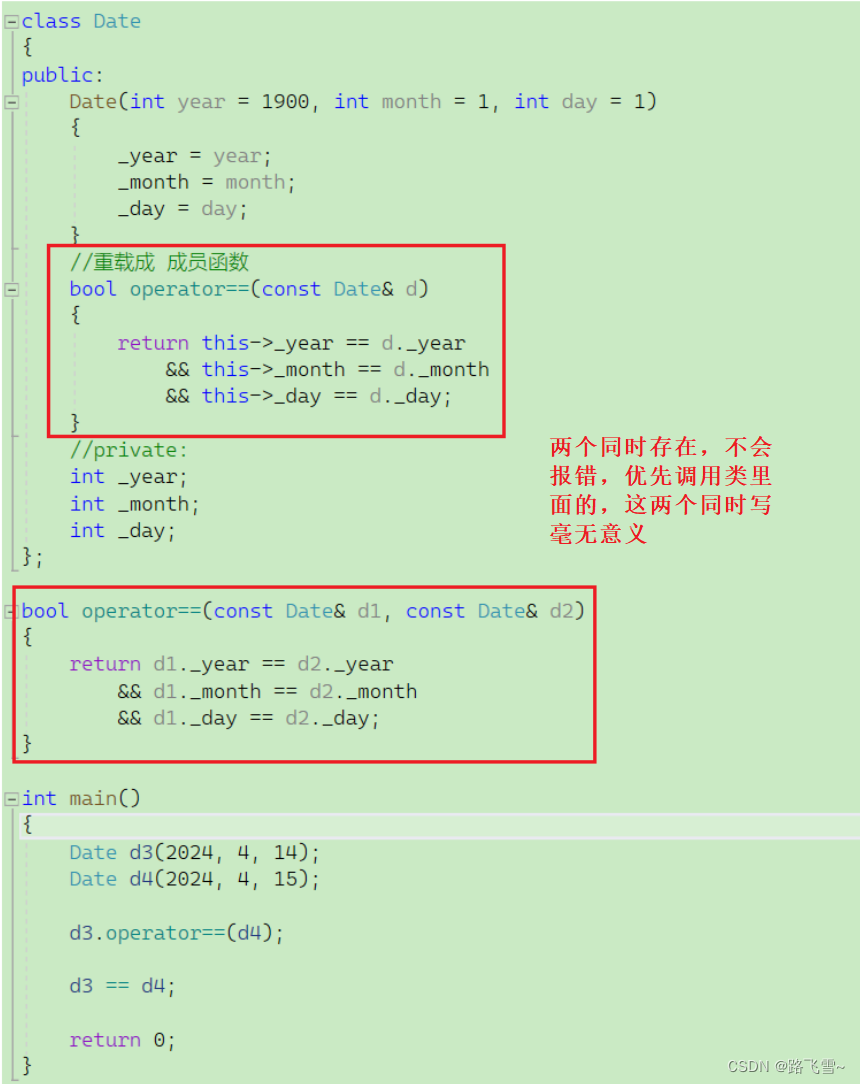
运算符有显式调用和直接调用,当写成显式调用时,就牺牲了代码的可读性,此时与函数的调用类似。
class Date
{
public:
Date(int year = 2024, int month = 5, int day = 5)
{
this->_year = year;
this->_month = month;
this->_day = day;
}
//显式调用d1.func(d4);
//bool func(const Date& d)
//{
// return this->_year == d._year
// && this->_month == d._month
// && this->_day == d._day;
//}
bool operator== (const Date & d)
{
return this->_year == d._year
&& this->_month == d._month
&& this->_day == d._day;
}
private:
int _year;
int _month;
int _day;
};
int main()
{
Date d1(2024, 5, 5);
Date d2(2024, 5, 6);
//显式调用
d1.operator==(d2);
//转换调用,等价于d1.operator==(d2),底层实现一样
d1 == d2;
return 0;
}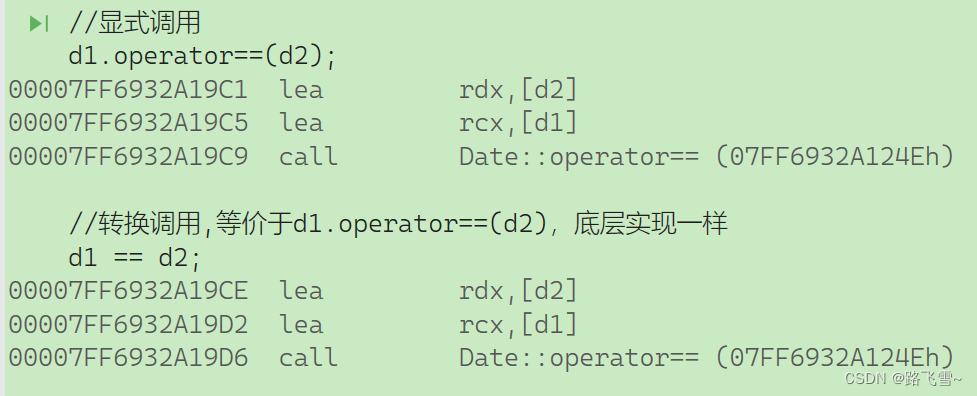
注意
1.不能通过连接其他符号来创建新的操作符:比如operator@
2.重载操作符必须有一个类类型参数
3.用于内置类型的运算符,其含义不能改变,例如:内置的整型+,不 能改变其含义
4.作为类成员函数重载时,其形参看起来比操作数数目少1,因为成员函数的第一个参数为隐
藏的this
5. .* :: sizeof ?: . 注意以上5个运算符不能重载。
易混淆:
拷贝构造:一个已经存在的对象,拷贝给另一个要创建初始化的对象
赋值拷贝/赋值重载:一个已经存在的对象,拷贝赋值给另一个已经存在的对象
1.2赋值运算符重载
(1)赋值运算符重载格式
<1>参数类型:const T& ,传递引用可以提高传参效率
<2>返回值类型:T& ,返回引用可以提高返回的效率,有返回值目的是为了连续赋值
<3>检查是否自己给自己赋值,避免损失
<4>返回 *this :要复合连续赋值的含义
当是两个数之间的赋值时,可直接返回 void ,若是三个数或者三个数以上,则不可以。
class Date
{
public:
Date(int year = 1, int month = 1, int day = 1)
{
_year = year;
_month = month;
_day = day;
}
void operator=( const Date& d)//无返回值
{
_year = d._year;
_month = d._month;
_day = d._day;
}
private:
int _year;
int _month;
int _day;
};
int main()
{
Date d1(2024, 5, 6);
Date d2(d1);
Date d3 = d2;
d1 = d2 = d3;//error
return 0;
} 
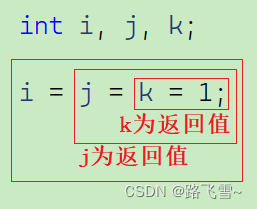
class Date
{
public:
Date(int year = 1, int month = 1, int day = 1)
{
_year = year;
_month = month;
_day = day;
}
//d1 = d2 = d3
Date& operator=( const Date& d)
{
if (this!= &d)
{
_year = d._year;
_month = d._month;
_day = d._day;
}
return *this;
}
private:
int _year;
int _month;
int _day;
};(2)赋值运算符只能重载成类的成员函数,不能重载成全局函数(规定)
原因:赋值运算符如果不显式实现,编译器会生成一个默认的。此时用户在类外自己实现一个全局的赋值运算符重载,就和编译器在类中生成的默认赋值运算符重载冲突了。
class Date
{
public:
Date(int year = 1, int month = 1, int day = 1)
{
_year = year;
_month = month;
_day = day;
}
//private:
int _year;
int _month;
int _day;
};
//重载成全局函数,此时就没有this指针了,需要给两个参数
Date& operator=(Date& left,const Date& right)//error:“operator =”必须是非静态成员
{
if (&left != &right)
{
left._year = right._year;
left._month = right._month;
left._day = right._day;
}
return left;
}
//error:
int main()
{
Date d1(2024, 5, 6);
Date d2(2024, 7, 6);
Date d3(2025, 8, 6);
d1 = d2 = d3;
return 0;
}传值返回和引用返回的区别:(在效率上的区别)
传值:返回拷贝
class Date { public: Date(int year = 1, int month = 1, int day = 1) { _year = year; _month = month; _day = day; } Date(const Date& d) { cout << "Date(const Date& d)" << endl; _year = d._year; _month = d._month; _day = d._day; } private: int _year; int _month; int _day; }; Date func()//传值返回--->拷贝一个临时对象 { Date d; return d; } int main() { func(); return 0; }
引用:返回别名
小结:
返回对象是一个局部对象或者临时对象,出了当前func()函数作用域,就析构销毁了,那么不能引用返回,用引用返回是存在风险的,因为引用对象在func()函数栈帧已经销毁了,
虽然返回引用可以减少一次拷贝,但是出了函数作用域,返回对象还在,才能引用返回。
小贴士:
出了作用域,返回对象还在没有析构,那就可以引用返回,减少拷贝
a.返回对象生命周期到了,会析构,传值返回
b.返回对象生命周期没到,不会析构,传引用返回
(3)用户没有显式实现时,编译器会生成一个默认赋值运算符重载,以值的方式逐字节拷贝。
注意:内置类型成员是直接赋值的,而自定义类型成员变量需要调用对应类的赋值运算符重载完成赋值。(跟拷贝构造函数类似,Date MyQueue 默认生成的赋值[浅拷贝/值拷贝][未涉及到资源管理],但是类似Stack/List[深拷贝][涉及到资源管理] 等需要我们自己实现赋值重载)
1.3前置++和后置++重载
++d :返回++以后的值
d++ :返回++之前的值
函数重载和运算符重载的区别:
函数重载:允许函数名相同,参数不同的函数存在
运算符重载:让自定义类型可以用运算符,并且控制运算符的行为,增强可读性
它们之间各论各的,没有关系,多个同一运算符重载可以构成函数重载。
前置++和后置++都是单操作数,此时该怎么办呢?
(规定)强行给后置++增加一个形参,这里不需要写形参名,因为接收值是多少不重要,也不需要用,这个参数仅仅是为了跟前置++构成重载区分。
两个逻辑颠倒,会导致逻辑错误,不会报错,但跟常规设定不符。

class Date
{
public:
Date(int year = 1, int month = 1, int day = 1)
{
_year = year;
_month = month;
_day = day;
}
++前置
Date& operator++()
{
_day += 1;
return *this;
}
后置++
C++规定:后置++重载时多增加一个int类型的参数,
但是调用函数时该参数不用传递,编译器自动传递
Date operator++(int)
{
Date temp(*this); 后置++是先使用后+1,因此需要返回+1之前的旧值,
故需在实现时需要先将this保存一份,然后再给this+1
_day += 1;
return temp; tmp是临时对象,因此只能以值的方式返回,不能返回引用
}
void Print()
{
cout << _year << "-" << _month << "-" << _day << endl;
}
private:
int _year;
int _month;
int _day;
};
int main()
{
Date d1(2024, 5, 7);
Date d2 = ++d1;
d1.Print();//2024-5-8
d2.Print();//2024-5-8 返回+1后的值
Date d3 = d1++;
d1.Print();//2024-5-9
d3.Print();//2024-5-8 返回+1前的值
return 0;
}
三、const成员
将 const 修饰的“成员函数”称之为const成员函数,const修饰类成员函数,实际修饰该成员函数隐含的this指针,表明在该成员函数中不能对类的任何成员进行修改。
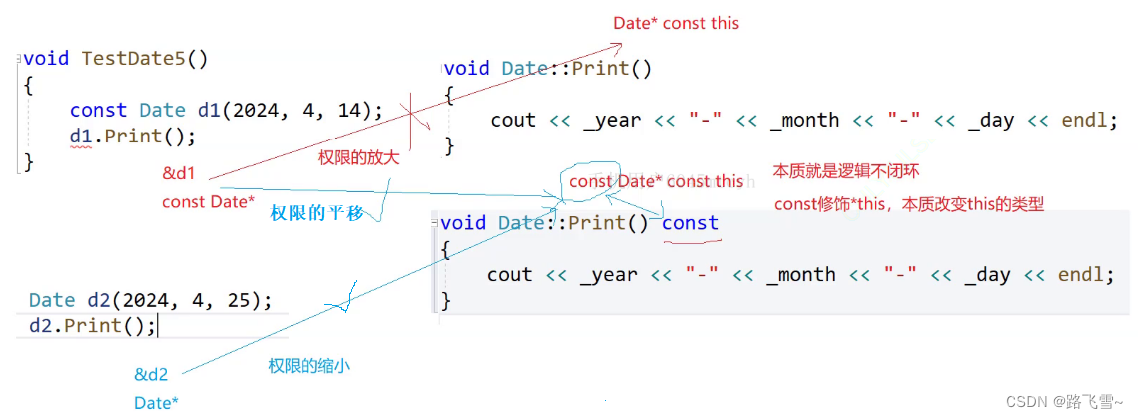
四、取地址及const取地址操作符重载
这两个默认成员函数一般不用重新定义,编译器会默认生成。
class A
{
public:
//取地址操作符重载
A* operator&()
{
return this;
}
//const取地址操作符重载
const A* operator&() const
{
return this;
}
private:
int _a = 1;
};
int main()
{
A a1;
const A a2;
cout << &a1 << endl;
cout << &a2 << endl;
return 0;
}这两运算符一般不需要重载,使用编译器生成的默认取地址的重载即可,只有特殊情况,才需要重载,比如想让别人获取到指定的内容,这两个运算符的目的是为了形成知识的闭环。
如若对你有帮助,记得点赞、收藏、关注哦!
若有误,望各位,在评论区留言或者私信我 指点迷津!!!谢谢^ ^ ~








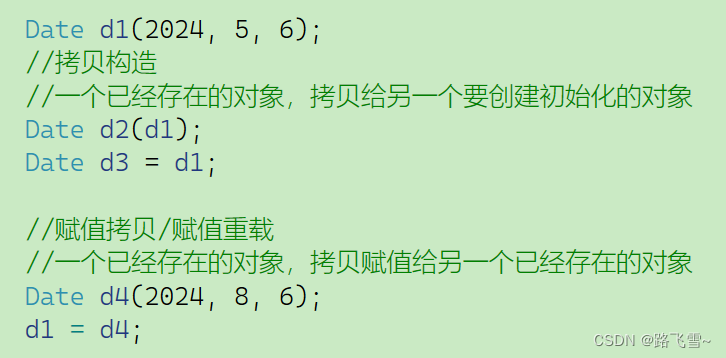
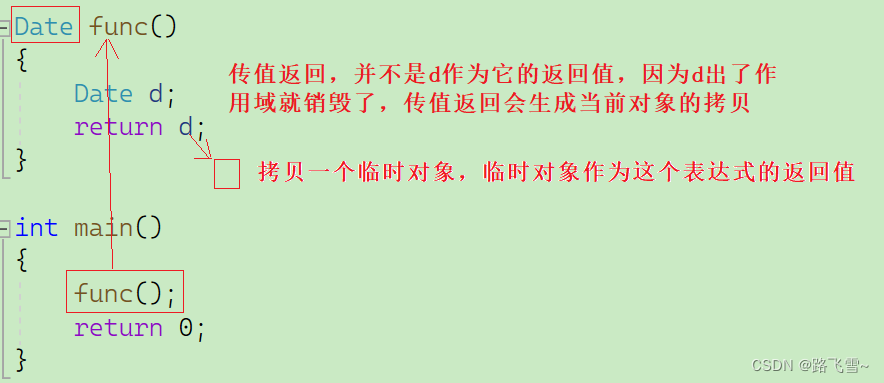

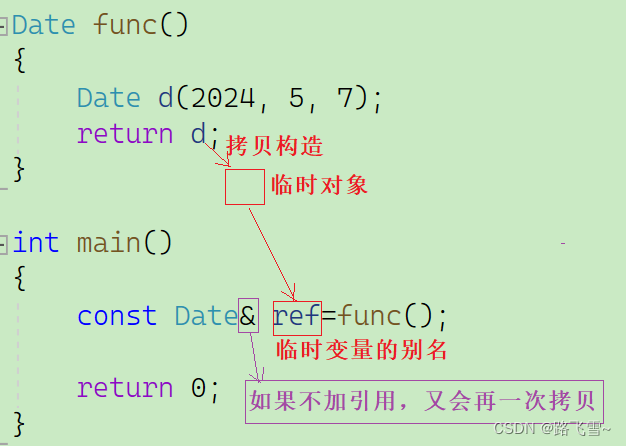
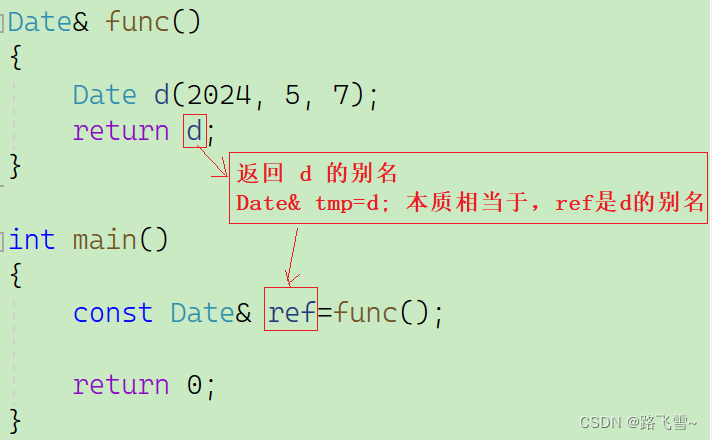
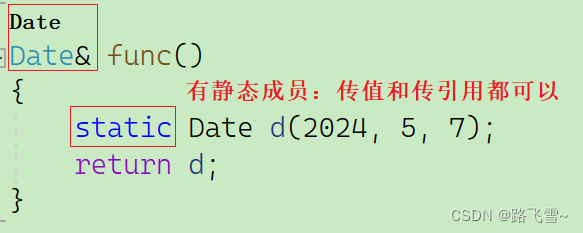
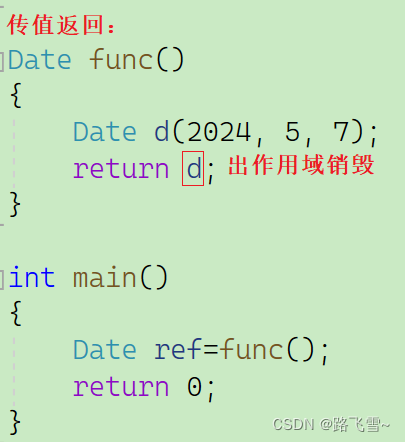
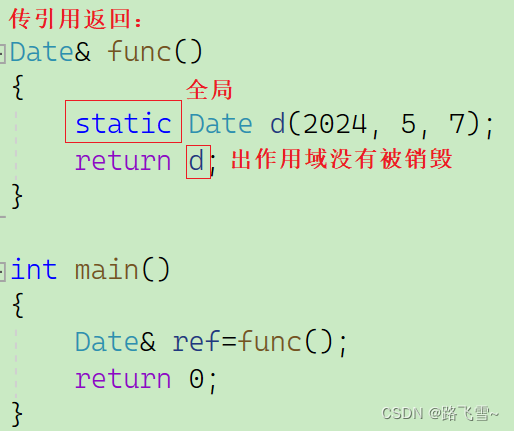
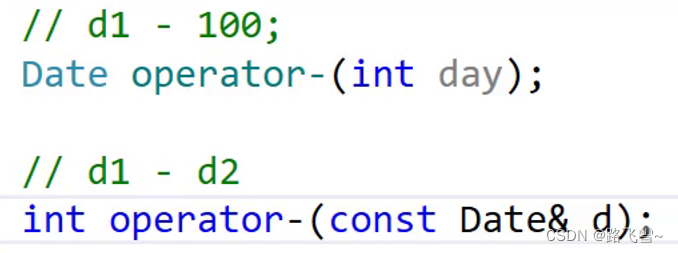














 1490
1490











 被折叠的 条评论
为什么被折叠?
被折叠的 条评论
为什么被折叠?








